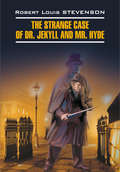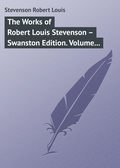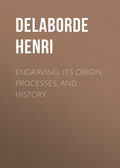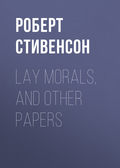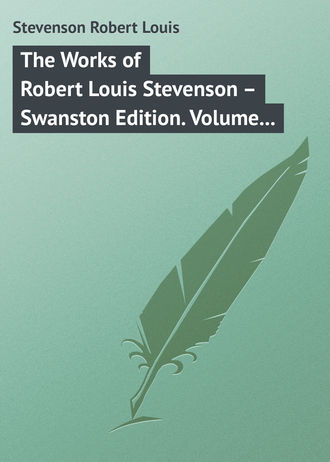
Роберт Льюис Стивенсон
The Works of Robert Louis Stevenson – Swanston Edition. Volume 3
FAMILIAR STUDIES OF MEN AND BOOKS
TO
THOMAS STEVENSON
CIVIL ENGINEER
BY WHOSE DEVICES THE GREAT SEA LIGHTS
IN EVERY QUARTER OF THE WORLD NOW SHINE MORE BRIGHTLY
THIS VOLUME IS IN LOVE AND GRATITUDE
DEDICATED BY HIS SON
THE AUTHOR
PREFACE BY WAY OF CRITICISM
These studies are collected from the monthly press. One appeared in the New Quarterly, one in Macmillan’s, and the rest in the Cornhill Magazine. To the Cornhill I owe a double debt of thanks; first, that I was received there in the very best society, and under the eye of the very best of editors; and second, that the proprietors have allowed me to republish so considerable an amount of copy.
These nine worthies have been brought together from many different ages and countries. Not the most erudite of men could be perfectly prepared to deal with so many and such various sides of human life and manners. To pass a true judgment upon Knox and Burns implies a grasp upon the very deepest strain of thought in Scotland, – a country far more essentially different from England than many parts of America; for, in a sense, the first of these men re-created Scotland, and the second is its most essentially national production. To treat fitly of Hugo and Villon would involve yet wider knowledge, not only of a country foreign to the author by race, history, and religion, but of the growth and liberties of art. Of the two Americans, Whitman and Thoreau, each is the type of something not so much realised as widely sought after among the late generations of their countrymen; and to see them clearly in a nice relation to the society that brought them forth, an author would require a large habit of life among modern Americans. As for Yoshida, I have already disclaimed responsibility; it was but my hand that held the pen.
In truth, these are but the readings of a literary vagrant. One book led to another, one study to another. The first was published with trepidation. Since no bones were broken, the second was launched with greater confidence. So, by insensible degrees, a young man of our generation acquires, in his own eyes, a kind of roving judicial commission through the ages: and, having once escaped the perils of the Freemans and the Furnivalls, sets himself up to right the wrongs of universal history and criticism. Now it is one thing to write with enjoyment on a subject while the story is hot in your mind from recent reading, coloured with recent prejudice; and it is quite another business to put these writings coldly forth again in a bound volume. We are most of us attached to our opinions; that is one of the “natural affections” of which we hear so much in youth; but few of us are altogether free from paralysing doubts and scruples. For my part, I have a small idea of the degree of accuracy possible to man, and I feel sure these studies teem with error. One and all were written with genuine interest in the subject; many, however, have been conceived and finished with imperfect knowledge; and all have lain, from beginning to end, under the disadvantages inherent in this style of writing.
Of these disadvantages a word must here be said. The writer of short studies, having to condense in a few pages the events of a whole lifetime, and the effect on his own mind of many various volumes, is bound, above all things, to make that condensation logical and striking. For the only justification of his writing at all is that he shall present a brief, reasoned, and memorable view. By the necessity of the case, all the more neutral circumstances are omitted from his narrative; and that of itself, by the negative exaggeration of which I have spoken in the text, lends to the matter in hand a certain false and specious glitter. By the necessity of the case, again, he is forced to view his subject throughout in a particular illumination, like a studio artifice. Like Hales with Pepys, he must nearly break his sitter’s neck to get the proper shadows on the portrait. It is from one side only that he has time to represent his subject. The side selected will either be the one most striking to himself, or the one most obscured by controversy; and in both cases that will be the one most liable to strained and sophisticated reading. In a biography, this and that is displayed; the hero is seen at home, playing the flute; the different tendencies of his work come one after another into notice; and thus something like a true general impression of the subject may at last be struck. But in the short study, the writer, having seized his “point of view,” must keep his eye steadily to that. He seeks, perhaps, rather to differentiate than truly to characterise. The proportions of the sitter must be sacrificed to the proportions of the portrait; the lights are heightened, the shadows overcharged; the chosen expression, continually forced, may degenerate at length into a grimace; and we have at best something of a caricature, at worst a calumny. Hence, if they be readable at all and hang together by their own ends, the peculiar convincing force of these brief representations. They take so little a while to read, and yet in that little while the subject is so repeatedly introduced in the same light and with the same expression, that, by sheer force of repetition, that view is imposed upon the reader. The two English masters of the style, Macaulay and Carlyle, largely exemplify its dangers. Carlyle, indeed, had so much more depth and knowledge of the heart, his portraits of mankind are felt and rendered with so much more poetic comprehension, and he, like his favourite Ram Dass, had a fire in his belly so much more hotly burning than the patent reading lamp by which Macaulay studied, that it seems at first sight hardly fair to bracket them together. But the “point of view” was imposed by Carlyle on the men he judged of in his writings with an austerity not only cruel but almost stupid. They are too often broken outright on the Procrustean bed; they are probably always disfigured. The rhetorical artifice of Macaulay is easily spied; it will take longer to appreciate the moral bias of Carlyle. So with all writers who insist on forcing some significance from all that comes before them; and the writer of short studies is bound, by the necessity of the case, to write entirely in that spirit. What he cannot vivify he should omit.
Had it been possible to rewrite some of these papers I hope I should have had the courage to attempt it. But it is not possible. Short studies are, or should be, things woven like a carpet, from which it is impossible to detach a strand. What is perverted has its place there for ever, as a part of the technical means by which what is right has been presented. It is only possible to write another study, and then, with a new “point of view,” would follow new perversions and perhaps a fresh caricature. Hence, it will be, at least, honest to offer a few grains of salt to be taken with the text; and as some words of apology, addition, correction, or amplification fall to be said on almost every study in the volume, it will be most simple to run them over in their order. But this must not be taken as a propitiatory offering to the gods of shipwreck; I trust my cargo unreservedly to the chances of the sea; and do not, by criticising myself, seek to disarm the wrath of other and less partial critics.
HUGO’S ROMANCES. This is an instance of the “point of view.” The five romances studied with a different purpose might have given different results, even with a critic so warmly interested in their favour. The great contemporary master of workmanship, and indeed of all literary arts and technicalities, had not unnaturally dazzled a beginner. But it is best to dwell on merits, for it is these that are most often overlooked.
BURNS. I have left the introductory sentences on Principal Shairp, partly to explain my own paper, which was merely supplemental to his amiable but imperfect book, partly because that book appears to me truly misleading both as to the character and the genius of Burns. This seems ungracious, but Mr. Shairp has himself to blame; so good a Wordsworthian was out of character upon that stage.
This half-apology apart, nothing more falls to be said except upon a remark called forth by my study in the columns of a literary Review. The exact terms in which that sheet disposed of Burns I cannot now recall; but they were to this effect – that Burns was a bad man, the impure vehicle of fine verses; and that this was the view to which all criticism tended. Now I knew, for my own part, that it was with the profoundest pity, but with a growing esteem, that I studied the man’s desperate efforts to do right; and the more I reflected, the stranger it appeared to me that any thinking being should feel otherwise. The complete letters shed, indeed, a light on the depths to which Burns had sunk in his character of Don Juan, but they enhance in the same proportion the hopeless nobility of his marrying Jean. That I ought to have stated this more noisily I now see; but that any one should fail to see it for himself is to me a thing both incomprehensible and worthy of open scorn. If Burns, on the facts dealt with in this study, is to be called a bad man, I question very much whether I or the writer in the Review have ever encountered what it would be fair to call a good one. All have some fault. The fault of each grinds down the hearts of those about him, and – let us not blink the truth – hurries both him and them into the grave. And when we find a man persevering indeed, in his fault, as all of us do, and openly overtaken, as not all of us are, by its consequences, to gloss the matter over, with too polite biographers, is to do the work of the wrecker disfiguring beacons on a perilous seaboard; but to call him bad, with a self-righteous chuckle, is to be talking in one’s sleep with Heedless and Too-bold in the arbour.
Yet it is undeniable that much anger and distress is raised in many quarters by the least attempt to state plainly what every one well knows, of Burns’s profligacy, and of the fatal consequences of his marriage. And for this there are perhaps two subsidiary reasons. For, first, there is, in our drunken land, a certain privilege extended to drunkenness. In Scotland, in particular, it is almost respectable, above all when compared with any “irregularity between the sexes.” The selfishness of the one, so much more gross in essence, is so much less immediately conspicuous in its results, that our demiurgeous Mrs. Grundy smiles apologetically on its victims. It is often said – I have heard it with these ears – that drunkenness “may lead to vice.” Now I did not think it at all proved that Burns was what is called a drunkard; and I was obliged to dwell very plainly on the irregularity and the too frequent vanity and meanness of his relations to women. Hence, in the eyes of many, my study was a step towards the demonstration of Burns’s radical badness.
But, second, there is a certain class, professors of that low morality so greatly more distressing than the better sort of vice, to whom you must never represent an act that was virtuous in itself as attended by any other consequences than a large family and fortune. To hint that Burns’s marriage had an evil influence is, with this class, to deny the moral law. Yet such is the fact. It was bravely done; but he had presumed too far on his strength. One after another the lights of his life went out, and he fell from circle to circle to the dishonoured sickbed of the end. And surely, for any one that has a thing to call a soul, he shines out tenfold more nobly in the failure of that frantic effort to do right, than if he had turned on his heel with Worldly Wiseman, married a congenial spouse, and lived orderly and died reputably an old man. It is his chief title that he refrained from “the wrong that amendeth wrong.” But the common, trashy mind of our generation is still aghast, like the Jews of old, at any word of an unsuccessful virtue. Job has been written and read; the tower of Siloam fell nineteen hundred years ago; yet we have still to desire a little Christianity, or, failing that, a little even of that rude, old Norse nobility of soul, which saw virtue and vice alike go unrewarded, and was yet not shaken in its faith.
WALT WHITMAN. This is a case of a second difficulty which lies continually before the writer of critical studies: that he has to meditate between the author whom he loves and the public who are certainly indifferent and frequently averse. Many articles had been written on this notable man. One after another had leaned, in my eyes, either to praise or blame unduly. In the last case, they helped to blindfold our fastidious public to an inspiring writer; in the other, by an excess of unadulterated praise, they moved the more candid to revolt. I was here on the horns of a dilemma; and between these horns I squeezed myself, with perhaps some loss to the substance of the paper. Seeing so much in Whitman that was merely ridiculous, as well as so much more that was unsurpassed in force and fitness, – seeing the true prophet doubled, as I thought, in places with the Bull in a China Shop, – it appeared best to steer a middle course, and to laugh with the scorners when I thought they had any excuse, while I made haste to rejoice with the rejoicers over what is imperishably good, lovely, human, or divine, in his extraordinary poems. That was perhaps the right road; yet I cannot help feeling that in this attempt to trim my sails between an author whom I love and honour and a public too averse to recognise his merit, I have been led into a tone unbecoming from one of my stature to one of Whitman’s. But the good and the great man will go on his way not vexed with my little shafts of merriment. He, first of any one, will understand how, in the attempt to explain him credibly to Mrs. Grundy, I have been led into certain airs of the man of the world, which are merely ridiculous in me, and were not intentionally discourteous to himself. But there is a worse side to the question; for in my eagerness to be all things to all men, I am afraid I may have sinned against proportion. It will be enough to say here that Whitman’s faults are few and unimportant when they are set beside his surprising merits. I had written another paper full of gratitude for the help that had been given me in my life, full of enthusiasm for the intrinsic merit of the poems, and conceived in the noisiest extreme of youthful eloquence. The present study was a rifacimento. From it, with the design already mentioned, and in a fit of horror at my old excess, the big words and emphatic passages were ruthlessly excised. But this sort of prudence is frequently its own punishment; along with the exaggeration, some of the truth is sacrificed; and the result is cold, constrained, and grudging. In short, I might almost everywhere have spoken more strongly than I did.
THOREAU. Here is an admirable instance of the “point of view” forced throughout, and of too earnest reflection on imperfect facts. Upon me this pure, narrow, sunnily-ascetic Thoreau had exercised a great charm. I have scarce written ten sentences since I was introduced to him, but his influence might be somewhere detected by a close observer. Still it was as a writer that I had made his acquaintance; I took him on his own explicit terms; and when I learned details of his life, they were, by the nature of the case and my own parti pris, read even with a certain violence in terms of his writings. There could scarce be a perversion more justifiable than that; yet it was still a perversion. The study, indeed, raised so much ire in the breast of Dr. Japp (H. A. Page), Thoreau’s sincere and learned disciple, that had either of us been men, I please myself with thinking, of less temper and justice, the difference might have made us enemies instead of making us friends. To him, who knew the man from the inside, many of my statements sounded like inversions made on purpose; and yet when we came to talk of them together, and he had understood how I was looking at the man through the books, while he had long since learned to read the books through the man, I believe he understood the spirit in which I had been led astray.
On two most important points, Dr. Japp added to my knowledge, and with the same blow fairly demolished that part of my criticism. First, if Thoreau were content to dwell by Walden Pond, it was not merely with designs of self-improvement, but to serve mankind in the highest sense. Hither came the fleeing slave; thence was he despatched along the road to freedom. That shanty in the woods was a station in the great Underground Railroad; that adroit and philosophic solitary was an ardent worker, soul and body, in that so much more than honourable movement, which, if atonement were possible for nations, should have gone far to wipe away the guilt of slavery. But in history sin always meets with condign punishment; the generation passes, the offence remains, and the innocent must suffer. No underground railroad could atone for slavery, even as no bills in Parliament can redeem the ancient wrongs of Ireland. But here at least is a new light shed on the Walden episode.
Second, it appears, and the point is capital, that Thoreau was once fairly and manfully in love, and, with perhaps too much aping of the angel, relinquished the woman to his brother. Even though the brother were like to die of it, we have not yet heard the last opinion of the woman. But be that as it may, we have here the explanation of the “rarefied and freezing air” in which I complained that he had taught himself to breathe. Reading the man through the books, I took his professions in good faith. He made a dupe of me, even as he was seeking to make a dupe of himself, wresting philosophy to the needs of his own sorrow. But in the light of this new fact, those pages, seemingly so cold, are seen to be alive with feeling. What appeared to be a lack of interest in the philosopher turns out to have been a touching insincerity of the man to his own heart; and that fine-spun airy theory of friendship, so devoid, as I complained, of any quality of flesh and blood, a mere anodyne to lull his pains. The most temperate of living critics once marked a passage of my own with a cross and the words, “This seems nonsense.” It not only seemed; it was so. It was a private bravado of my own, which I had so often repeated to keep up my spirits that I had grown at last wholly to believe it, and had ended by setting it down as a contribution to the theory of life. So with the more icy parts of this philosophy of Thoreau’s. He was affecting the Spartanism he had not; and the old sentimental wound still bled afresh, while he deceived himself with reasons.
Thoreau’s theory, in short, was one thing and himself another: of the first, the reader will find what I believe to be a pretty faithful statement and a fairly just criticism in the study; of the second he will find but a contorted shadow. So much of the man as fitted nicely with his doctrines, in the photographer’s phrase, came out. But that large part which lay outside and beyond, for which he had found or sought no formula, on which perhaps his philosophy even looked askance, is wanting in my study, as it was wanting in the guide I followed. In some ways a less serious writer, in all ways a nobler man, the true Thoreau still remains to be depicted.
VILLON. I am tempted to regret that I ever wrote on this subject, not merely because the paper strikes me as too picturesque by half, but because I regarded Villon as a bad fellow. Others still think well of him, and can find beautiful and human traits where I saw nothing but artistic evil; and by the principle of the art, those should have written of the man, and not I. Where you see no good, silence is the best. Though this penitence comes too late, it may be well, at least, to give it expression.
The spirit of Villon is still living in the literature of France. Fat Peg is oddly of a piece with the work of Zola, the Goncourts, and the infinitely greater Flaubert; and, while similar in ugliness, still surpasses them in a native power. The old author, breaking with an éclat de voix out of his tongue-tied century, has not yet been touched on his own ground, and still gives us the most vivid and shocking impression of reality. Even if that were not worth doing at all, it would be worth doing as well as he has done it; for the pleasure we take in the author’s skill repays us, or at least reconciles us to the baseness of his attitude. Fat Peg (La Grosse Margot) is typical of much; it is a piece of experience that has nowhere else been rendered into literature; and a kind of gratitude for the author’s plainness mingles, as we read, with the nausea proper to the business. I shall quote here a verse of an old student’s song; worth laying side by side with Villon’s startling ballade. This singer, also, had an unworthy mistress, but he did not choose to share the wages of dishonour; and it is thus, with both wit and pathos, that he laments her fall: —
Nunc plango florem
Ætatis teneræ
Nitidiorem
Veneris sidere:
Tunc columbinam
Mentis dulcedinem,
Nunc serpentinam
Amaritudinem.
Verbo rogantes
Removes ostio,
Munera dantes
Foves cubiculo,
Illos abire præcipis
A quibus nihil accipis,
Cæcos claudosque recipis,
Viros illustres decipis
Cum melle venenosa.1
But our illustrious writer of ballades it was unnecessary to deceive; it was the flight of beauty alone, not that of honesty or honour, that he lamented in his song; and the nameless mediæval vagabond has the best of the comparison.
There is now a Villon Society in England; and Mr. John Payne has translated him entirely into English, a task of unusual difficulty. I regret to find that Mr. Payne and I are not always at one as to the author’s meaning; in such cases I am bound to suppose that he is in the right, although the weakness of the flesh withholds me from anything beyond a formal submission. He is now upon a larger venture, promising us at last that complete Arabian Nights to which we have all so long looked forward.
CHARLES OF ORLEANS. Perhaps I have done scanty justice to the charm of the old Duke’s verses, and certainly he is too much treated as a fool. The period is not sufficiently remembered. What that period was, to what a blank of imbecility the human mind had fallen, can only be known to those who have waded in the chronicles. Excepting Comines and La Salle and Villon, I have read no author who did not appal me by his torpor; and even the trial of Joan of Arc, conducted as it was by chosen clerks, bears witness to a dreary sterile folly, – a twilight of the mind peopled with childish phantoms. In relation to his contemporaries, Charles seems quite a lively character.
It remains for me to acknowledge the kindness of Mr. Henry Pyne, who, immediately on the appearance of the study, sent me his edition of the Debate between the Heralds: a courtesy from the expert to the amateur only too uncommon in these days.
KNOX. Knox, the second in order of interest among the reformers, lies dead and buried in the works of the learned and unreadable M’Crie. It remains for some one to break the tomb and bring him forth, alive again and breathing, in a human book. With the best intentions in the world, I have only added two more flagstones, ponderous like their predecessors, to the mass of obstruction that buries the reformer from the world; I have touched him in my turn with that “mace of death,” which Carlyle has attributed to Dryasdust; and my two dull papers are, in the matter of dulness, worthy additions to the labours of M’Crie. Yet I believe they are worth reprinting in the interest of the next biographer of Knox. I trust his book may be a masterpiece; and I indulge the hope that my two studies may lend him a hint or perhaps spare him a delay in its composition.
Of the PEPYS I can say nothing; for it has been too recently through my hands; and I still retain some of the heat of composition. Yet it may serve as a text for the last remark I have to offer. To Pepys I think I have been amply just; to the others, to Burns, Thoreau, Whitman, Charles of Orleans, even Villon, I have found myself in the retrospect ever too grudging of praise, ever too disrespectful in manner. It is not easy to see why I should have been most liberal to the man of least pretensions. Perhaps some cowardice withheld me from the proper warmth of tone; perhaps it is easier to be just to those nearer us in rank and mind. Such at least is the fact, which other critics may explain. For these were all men whom, for one reason or another, I loved; or when I did not love the men, my love was the greater to their books. I had read them and lived with them; for months they were continually in my thoughts; I seemed to rejoice in their joys and to sorrow with them in their griefs; and behold, when I came to write of them, my tongue was sometimes hardly courteous and seldom wholly just.
R. L. S.



